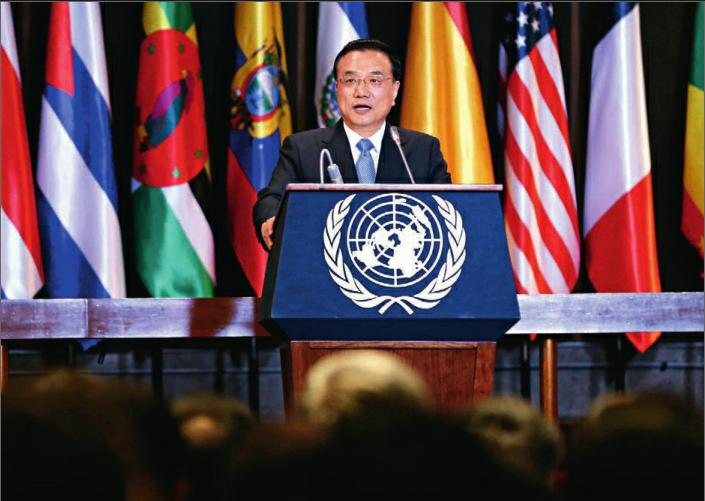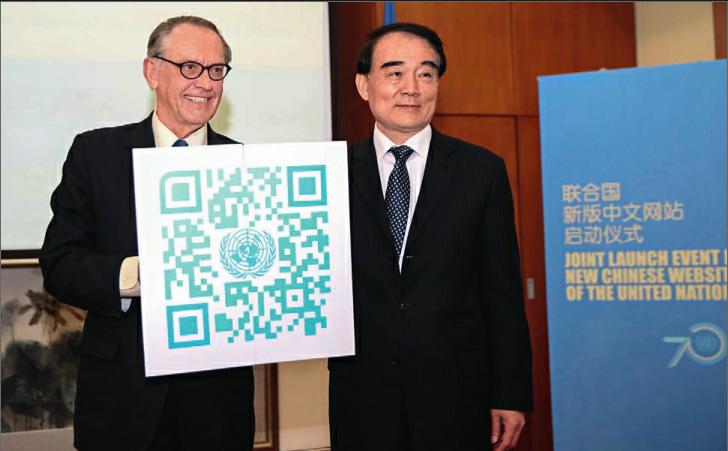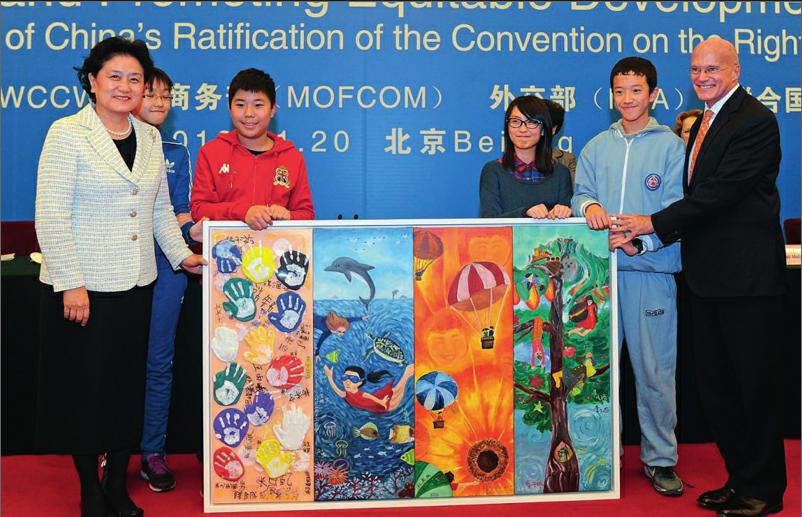Common Responsibility
By+staff+reporter+HOU+RUILI



IN September 2015, Chinese President Xi Jinping attended the 70th anni- versary celebration of the founding of the UN. Together with leaders from around the world, he reiterated the international communitys commitment to the tenets and principles of the UN Charter, while discussing how to enhance the UNs position at the core of global governance under the new situation.
Via its reform and opening-up, as well as peaceful development, China has not only strengthened its national power and gradually integrated into the international community, but also fulfilled the UNs purpose of maintaining international peace and security, while promoting international friendship.
Maintaining Peace and Security
In order to help the worlds people out of the abyss of war and embark on the path of peaceful development, the victorious nations of WWII, led by Chi- na, the U.K., the U.S., the Soviet Union and France, established the UN in 1945. Based on alphabetical order, China was the first country to sign the UN Charter, symbol of the UNs birth. As permanent members of the Security Council, the five founding nations have the right to adopt coercive action to maintain international peace and security, and also possess veto power.
In 1949 the defeated government of the Republic of China (ROC) retreated to Taiwan Province, and the Peoples Republic of China (PRC) was founded on the mainland. The territories on either side of the Taiwan Straits have since been divided and governed separately. Although continuing to use the designations “Republic of China” and “government of the Republic of China,” the Taiwan authority has completely forfeited its right to exercise state sovereignty on behalf of China. By dint of continual application, the PRC ultimately had its lawful rights restored in the UN in October 1971.
As a permanent member of the UN Security Council, China has performed its enormous task of safeguarding world peace and settling regional conflicts. Particularly after the reform and opening-up, which led to significant improvement to its national power, China has been able to participate proactively in cooperation with the UN, becoming a vital force for maintaining world peace and security.
In conflict mediations, China has promoted the cooperative mechanism of regional security dialogue and participated in the Asia-Pacific region multilateral security dialogue. China contributed in a constructive manner to maintaining peace and stability on the Korean Peninsula and in Northeast Asia during the Six-Party Talks on the North Korean nuclear issue.endprint
“On the issue of Afghanistan, Chinas Ministry of Foreign Affairs has appointed a special envoy to Afghanistan to strengthen engagement and coordination with the country and with relevant parties, making a success of the Fourth Ministerial Conference of the Istanbul Process on Afghanistan in October 2014,” said Li Dongyan, research fellow at the Institute of World Economics and Politics of the Chinese Academy of Social Sciences.
According to Li, China has also participated in Iraqs peaceful reconstruction, promoting cooperation in various areas, such as offering humanitarian aid and supporting anti-terrorism actions. China has also paid close attention to South Sudan, the government having sent its special representative for African affairs to South Sudan and its surrounding countries on several occasions to conduct mediations. In early 2015, a key mission of Foreign Minister Wang Yis visit to five African nations in early 2015 was to mediate the conflict in South Sudan. China also holds Intergovernmental Authority on Development (IGAD) negotiations for South Sudans peace process, advancing four proposals, namely a general cease-fire, establishment of a transitional government as soon as possible, firm support for IGADs role of mediation, and relief of the local humanitarian situation.
Along with its prosperity and development, China has assumed greater responsibilities for global security and prosperity.
Under the principles of respecting state sovereignty, non-interference in internal affairs, and peacefully settling disputes, China has actively participated in UN peacekeeping operations in Cambodia, East Timor, Haiti and the Democratic Republic of the Congo. In addition, China has also sent a large number of military observers, engineering and medical units, and more than 2,000 person-times of military personnel and civilian police to cover almost all hot spots.
According to Hervé Ladsous, UN under-secretary-general for peacekeeping operations, Chinas peacekeeping force has significantly contributed to world peace; and Chinese peacekeepers are also well-trained, highly disciplined and qualified, excel in their work, and are well-equipped.
China has ushered in a new perception of security by appropriately resolving historical border issues and enhancing mutual military trust. China has cooperated effectively with other countries in combating terrorism, separatism and extremism, and conducted joint anti-terrorism military exercises with member states of the Shanghai Cooperation Organization and Pakistan.endprint
Moreover, China helps other countries with earthquake relief work and anti-terrorist escorts, offering water supplies and medical treatment, in addition to evacuating its nationals in emergent situations.
A Shared Belief
The UN Charter clearly states that all countries in the world enjoy equal sovereignty, with inviolable internal affairs, and territorial integrity that must be assured. Countries advocate the settlement of international disputes through peaceful means, oppose threat or use of force in international relations, and eliminate security threats via cooperation. These precepts have since stood as the basic norms of contemporary international relations.
The charter also stipulates the duties, rights and obligations of member states. The UN Security Council is authorized to assume the primary responsibility of safeguarding international peace and security. The collective security mechanism has supplanted traditional military alliances and the outdated law of the jungle, and the framework of international laws in support of peace has come into existence.
Formulated in 1945, the charter constitutes the collective wisdom of representatives from various countries, according to Miguel de Serpa Soares, the under-secretary-general for legal affairs and United Nations Legal Counsel. During its 70 years of practice, it has conformed to era development and effectively maintained world peace.
During his meeting with a delegation from India in December 1953, then Chinese Premier Zhou Enlai first propounded the Five Principles of Peaceful Coexistence. The next year China, India and Myanmar jointly initiated these principles as the guideline for international relations and exchanges. More than 60 years have now passed, and the principles have not only become the foundation for Chinas pursuit of an independent foreign policy of peace that has found its reflection in many bilateral treaties China has concluded with other countries, but also been included in a large number of multilateral treaties and international documents. They include the Declaration on Principles of International Law concerning Friendly Relations and Cooperation among States in Accordance with the Charter of the United Nations approved by the UN General Assembly in 1970, as well as the Declaration on the Establishment of a New International Economic Order that a special session of the UN General Assembly adopted in 1974.endprint

Mr. de Serpa Soares said that as the UNs legal counsel, he could daily feel the impact of the Five Principles of Peaceful Coexistence. One major reason is that the principles, to a large extent, have been included in the UN Charter, thereby becoming an indispensable source for UN members when they discuss international laws, he explained. In 1961, the UN General Assembly proposed a topic, namely consideration of the principles of international laws relating to peaceful coexistence among states. Influenced by the Bandung Conference in 1955, the conference of non-aligned countries that was held in Belgrade in 1961 set these principles as the guideline for the Non-Aligned Movement.
To prevent international development organizations and traditional donor nations from imposing various political conditions in their assistance criteria, China hews to the principle of common but differentiated responsibilities for international aid.
World Bank President Jim Yong Kim was quoted as saying that the World Bank should adopt effective and nonideological solutions to help the vast number of developing countries cope with various challenges of development in their efforts to reduce poverty and achieve common prosperity.” This idea is almost identical with the concepts of“seeking truth from facts” and “proceeding from reality in all work” advocated by China.
Active Constructor of the International Order
By implementing and defending UN-Charter-centric international laws and relations, China has concluded over 23,000 bilateral treaties, signed more than 400 multilateral treaties, and joined all of the UNs specialized agencies, as well as a majority of global inter-governmental organizations. During cooperation with UN specialized agencies, many of Chinas causes have reached international levels. Meanwhile China has shared with the international community its developmental model and experience.
According to Li Dongyan, during the past decade, the way China participates in the UN peacekeeping and security affairs has changed. In addition to increasing the size of its peacekeeping personnel and the regions to which it dispatches teams, China has also participated more in civilian protection, humanitarian aid, and legal construction. At the time of the 70th anniversary of the UNs founding, the Chinese government promised further support and participation in UN peacekeeping operations. China is considering sending helicopters for UN peacekeeping operations, and is willing to detail more peacekeeping police, such as legal and medical experts and crime detectives. The country will continue to support the construction and training of the African Unions peacekeeping rapid response force.endprint
In February 2011, during the UN Security Council open debate held in Brazil on the correlation between security and development, China stressed that development is the guarantee of security and appealed to the Security Council to pay due attention to the relationship between them, so achieving synchronous advances in politics, security and development. China also emphasized the construction of governance capacity during peace-building by providing basic services and facilitating reconstruction. This represents Chinas thinking on UN peacekeeping and peace-building.
China is an active constructor of the postwar international order and international rule of law. It is devoted to promoting democracy and rule of law in international relations, while actively building new international relations based on win-win cooperation. China is also an important force in defending the legitimate rights and interests of developing countries, thus making the world more equal, harmonious and safe. The Belt and Road Initiatives and the Asian Infrastructure Investment Bank embody Chinas latest practice in implementing these ideals.
China has thus far established various partnerships with 75 countries and five regional organizations, and is firmly committed to solidifying cooperation, maintaining common security, and enlarging common interests.
China adheres to the principle of inclusive development. Taking into full account various countries practical conditions and development patterns, China has fleshed out a new pattern of financing and fund utilization. By introducing industrial parks and special economic zones, it has helped recipient countries create an external environment that benefits their economic development. endprint
endprint

